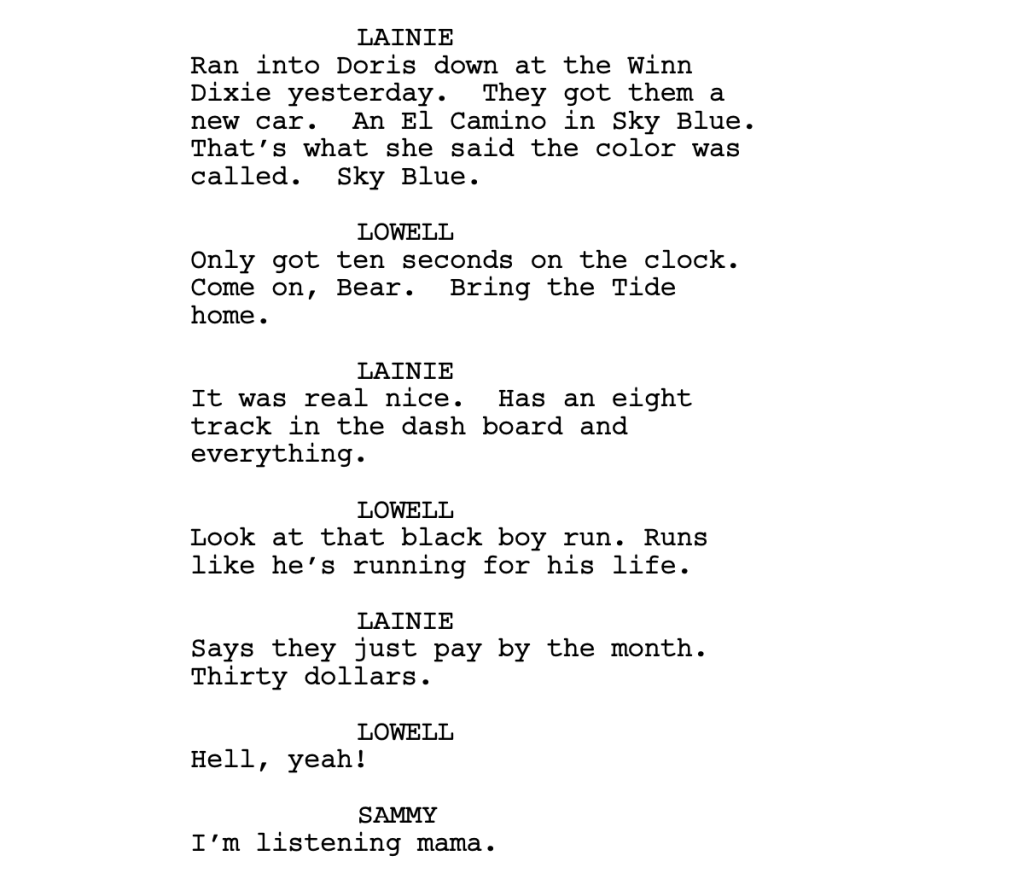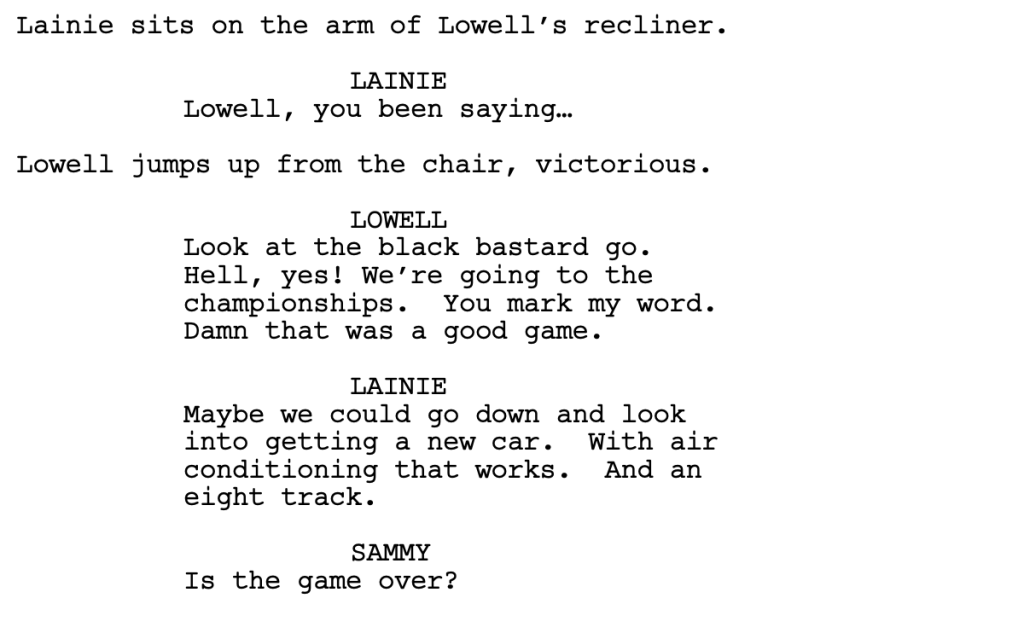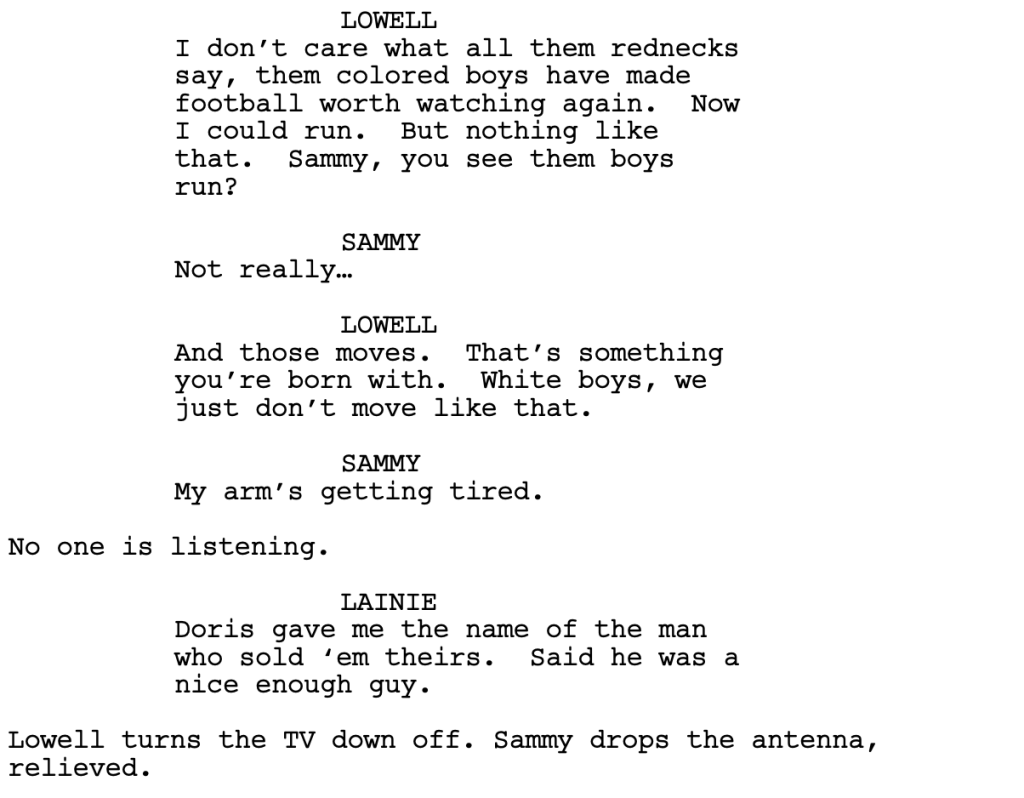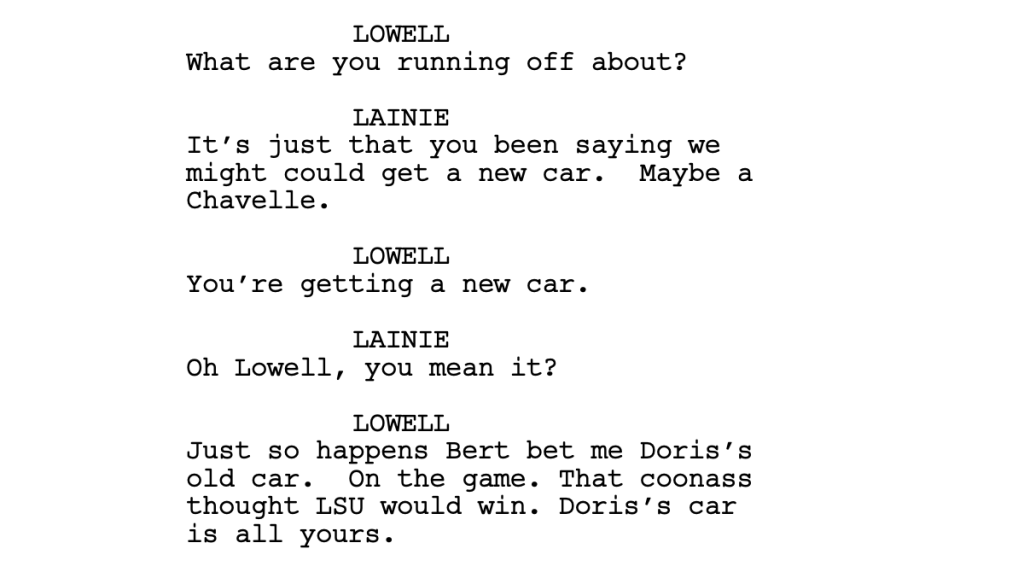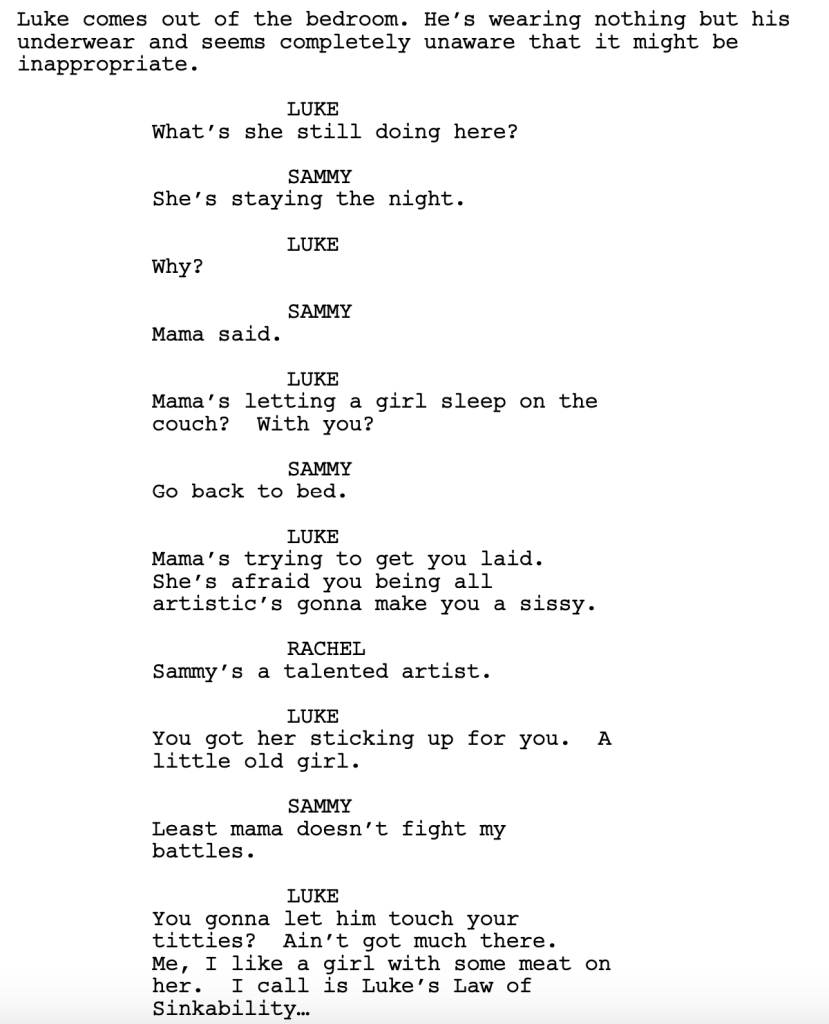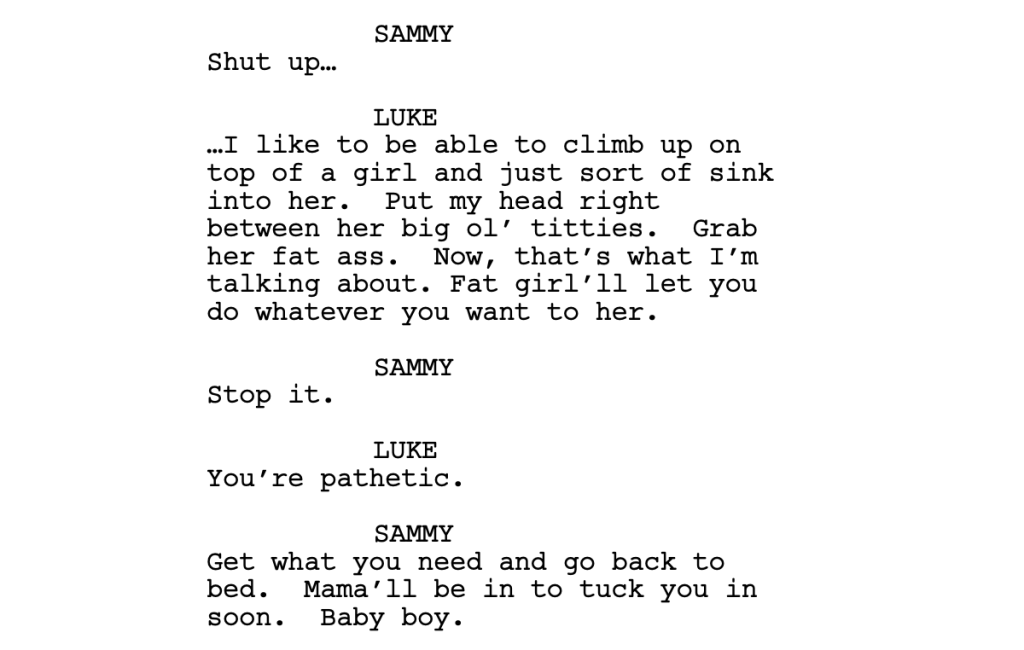Is this the best unknown screenplay in Hollywood?
Genre: Drama
Premise: In 1971 Alabama, a poor, gifted, teen living in a trailer with his abusive family is shocked when the prettiest girl in school pays him a visit and asks him if he’ll do her a giant favor.
About: This script was sent to me for a consultation by a director named Ravin Gandhi. The writer, Elyzabeth Gregory Wilder, originally wrote it as a play. She has since adapted it into a screenplay. Wilder has had her plays produced at the Royal Court in London, Alabama Shakespeare Festival, Denver Center, the Hartford Stage, amongst many others. She’s now looking to expand into a screenwriting career. You can learn more about her at her website. By the way, there are a lot of twists and turns in this script. So I encourage you to read it before the review so you’re not spoiled. The link to the script is at the bottom of the review. :)
Writer: Elyzabeth Gregory Wilder
Details: 111 pages
Okay, a little backstory here. Director Ravin Gandhi made his first film a couple of years ago and the biggest lesson he learned, during that process, was how important it was to have a great script. You have a great script, you get better actors. If you have better actors, you get a bigger budget. You have a bigger budget, you get a better team. You get a better team, you get better production value. And, of course, all of those things lead to a bigger and better distribution deal.
So, for his second movie, he made it his number one priority to find a great screenplay. After scouring every corner of the internet and as many agencies that would give him the time of day, the casting director who’d worked on his first film told him she knew a really great playwright who’d written this amazing play. Would he like to take a look?
Ravin said sure with zero expectations, read the play, and was blown away by it. That’s where I came in. He sent it to me, basically wanting to know from the guy who’s read everything, if the script was as good as he thought it was. I hate being put under that kind of pressure because 99 times out of a 100, I have to tell the person, ‘No, it isn’t as good as you think it is.’ But this time, it was.
Spirit of Ecstasy takes place in 1971 Alabama and follows 17 year-old Sammy, a poor shy boy who attends a local private school on scholarship. Unlike almost anyone else in Alabama, Sammy loves to draw, loves to create, loves to explore art. Unfortunately, because he’s poor and likes all these weird things, he doesn’t have any friends.
Sammy lives on a salvage yard in a trailer with his unabashedly “white trash” family. There’s 16 year-old troublemaker Luke, as cool and handsome as Sammy is shy and anxious. There is Lainie, Sammy’s mother, a once optimistic local beauty who’s been relegated to cutting coupons and staring at advertisements for nice neighborhoods she’s never going to live in. And then there’s Lowell, a local football star who’s become a beer-guzzling waste of space.
After Sammy comes home from school one day, we learn that he’s secretly fixing up one of the cars in the junkyard so that, when he’s old enough, he can leave this place. That opportunity may be coming sooner than he thinks. That night, there’s a knock on the door. Lainie goes to answer and is baffled at what she sees standing there – a beautiful girl.
This is Rachel, the most popular girl at Sammy’s school. Lainie isn’t sure what’s more surprising, that someone from the “right side of the tracks” is visiting them or that Sammy knows a girl. She immediately invites Rachel in and begins her southern hospitality routine. Later, once Rachel is able to get Sammy alone, she asks him if he’ll do her a favor and drive her to New Orleans. Sammy doesn’t know what to say.
As dinner rolls around, an increasingly pale-looking Rachel scurries off to the bathroom to throw up and that’s when we learn the true reason why she’s come. She’s pregnant. And she needs to get to New Orleans to get an abortion. She can’t have anybody in town knowing about this, which is why she’s come to the one family nobody cares about.
As Rachel carefully orchestrates the evening so that she can stay the night, she begins to see how abusive Sammy’s family really is. There are things going on behind closed doors that shouldn’t be happening, which only increases the urgency of her and Sammy having to leave.
After giving Sammy the first kiss of his life, she conspires with him to make a run for it before dawn, which Sammy agrees to. But we can’t help but wonder if Rachel’s adoration for Sammy is all just a ruse to get what she needs. Once she’s taken care of her problem, will she ditch him? We may never find out because Lainie discovers their secret plan and goes into nuclear preventative mode to stop her son from leaving her. Pulled between Rachel and his mother, Sammy will have to make the biggest decision of his life. What will he do?
There are soooo many things I liked about this script.
Let’s start with the plot. You guys have heard me go full hater-mode on drama scripts. Writers seem to think that the Drama genre gives them permission to be boring. Look no further than yesterday’s script, Rewired. The Spirit of Ecstasy shows you how to do it right. What’s the big difference? They use a time constraint.
This story doesn’t take place over a summer, a month, or even a week. It takes place in one night. That urgency covers up all of the problems that usually sink drama scripts because we know the issue is going to be resolved within the next 12 hours. That’s how you do drama. It’s the same idea behind 1917. A typical movie about World War 1 in 1917? Nobody cares. But make that story real-time and all of a sudden, “Wow, this is cool.”
That’s initially what pulled me in – just how fast a drama script was moving. I’m not used to that.
Next up, I loved the dramatic question at the center of the story. Dramatic questions are questions you can pose in your script that, if they’re compelling enough, make the reader want to stick around to find out the answer. The dramatic question in Spirit of Ecstasy that hooked me was, “Is Rachel conning Sammy?” Is she pretending to like him because she’s desperate to fix this problem she has? Or does she really like Sammy? Or does she go in planning to con him, but then actually starts to fall for him?
The fact that I was never entirely sure kept me flipping the pages. I had to know if Rachel was honest or not.
From there, the script exhibited an authenticity regarding the time and place that I rarely see. I’ve read scripts about the south in the 70s before. They all fall into the same stereotype traps. From everyone’s super religious to everyone’s a hick to they’re all walking around with guns. This feels different. Sammy is far from your typical southern stereotype. He’s smart and artistic and dances to the beat of his own drum. Even when the characters in Spirit do move towards “stereotype” territory, their actions and dialogue are so specific that it never feels fake or “written.”
By the way, that’s how you avoid cliche. You emphasize specificity. The more specific you can be about a time or place and how people act, that’s what makes your script feel real. The more vague you are, the more cliche you will be. It’s the difference between saying a tennis player “hits a forehand” and a tennis player “slides across the red clay, crushing a forehand down the line, past the outstretched racket of his opponent.”
Which leads us to the biggest star of the script – the dialogue. It’s been a while since I’ve read dialogue this good. The best way for me to identify good dialogue is when I never once am aware of the dialogue. Typically, when I read a script, I can feel the writer’s thought pattern as they’re writing the words of their characters. You sort of see them working out in their head what the characters need to say in the scene.
That never happened once in Spirit of Ecstasy. Every time people spoke, I became lost in their conversations. So much so that I would encourage anyone who wants to be a good dialogue writer to read this script. Because there are so many dialogue lessons you can learn from it.
Take this early conversation from page 9. We’ve just come into the trailer for the first time. We’ve been introduced to his parents, Lainie and Lowell. Lowell is watching the football game, making Sammy hold up an antennae to keep the picture clear. Meanwhile, Lainie is going through the newspaper, looking at houses and cars for sale. We pick up the conversation mid-scene…
This is a dialogue tool that all of you should have in your arsenal. A lot of amateur writers get tripped up in assuming that dialogue must be logical. It must be a ‘your turn, my turn’ exchange of information where every question must be answered with a cohesive insightful response. No. Real life conversation is much messier than that. One of the cool ways you can take advantage of this is by writing conversations where the characters rarely, if ever, respond to the other character, which is what you see here.
But it’s not just a cool trick. Notice how this dialogue does three things. One, what Lainie’s talking about – wanting to get a nice new car so that she can look respectable – tells us EXACTLY who her character is. We know Lainie after this scene. Two, what Lowell talks about – his obsession with the game, his not so subtle racist remarks – tells us exactly who he is. This is a simple man with a simplistic view of the world. And three, it tells us exactly who these two are AS A COUPLE. Their (non) conversation tells us everything we need to know about this marriage within a minute.
That’s what great dialogue is. It’s entertaining in and of itself. But it’s also teaching us things about the people saying the words.
Another one of my favorite dialogue exchanges happens later in the script. **BIG SPOILER contained in the below example** We’ve hinted, at this point, that Lainie is sexually abusive towards Luke. But this is something that’s never spoken about in the house. In this scene, Luke has gotten ready for bed and is passing by Sammy and Rachel, who are on the couch.
Good dialogue does more than one thing at a time. At first glance, this scene is about Luke making fun of his brother regarding his lack of sexual experience. The dialogue is funny, albeit in an uncomfortable way. But take a closer look and pay attention to what Luke is saying. Luke’s sexual experience is limited as well, exclusively to his mother. So even though he’s offending Sammy here, what he’s really talking about is his own sexual abuse.
This is highly advanced stuff that I rarely see in screenwriting these days. Nobody understands subtext. Or, the ones who do, are too busy rushing through the script to come up with any clever ways to explore what’s happening beneath the surface. The writer is telling us, without having to ever tell us, that Luke is being abused by his mother. In bad scripts, writers will have their Luke character walk straight up to their mom and say: “You need to stop sexually abusing me mom!” “I’m not sexually abusing you.” That’s an uninteresting way to explore the issue. Instead, you want to talk around it, talk under it, talk about it abstractly, hint at it in conversations with other characters. Not only is that more true to life, it leads to much more interesting conversations.
I could go on about this script for a long time. I think the characters are, honestly, the kinds of roles that win actors Oscars. The structure is so tight that it makes what’s, essentially, a bunch of characters speaking for 90 minutes, go by faster than you can snap your fingers. And the dialogue is consistently awesome. It’s kind of reignited my belief that there are really good screenplays out there waiting to be discovered. Check it out for yourself and let me know what you think in the comments!
Script link: Spirit of Ecstasy
[ ] What the hell did I just read?
[ ] wasn’t for me
[ ] worth the read
[x] impressive
[ ] genius
What I learned: This reinforces my belief that dramas can almost become de facto “thrillers” if you add a really tight time frame. For that reason, I encourage anyone writing a drama to consider tightening the time frame of your story. You may be shocked at how much it improves the script. As I told Ravin, “This doesn’t work if it takes place over one week. Or even two days. It works specifically because it takes place over 12 hours.



